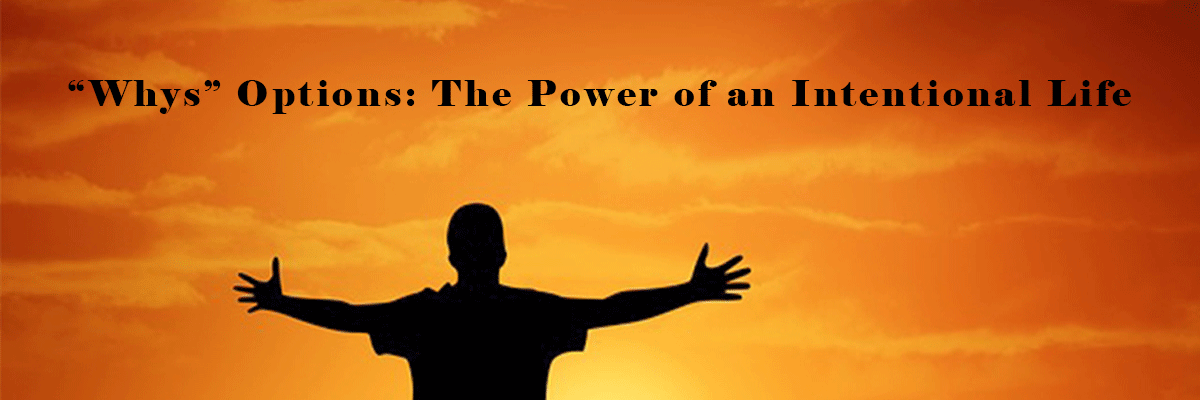[1]
Many wise people, like the Farsi poet in his musing, believe that the fundamental problem of the human race is purposelessness. That the persistent, basal question each person longs to answer is simply, “Why do I exist?”
I agree.
Despite time, culture, or privilege, in ancient Athens or contemporary Singapore, in cultured opera houses or at pounding music concerts, forms of the existential “why” inquiry haunt the human psyche. That question forms the psychical boundary-marker between the mere brutes and human beings.
“What is the purpose of life, my life, the point of it all?” All people intuitively ask that question. And they all tackle it in some way, even when they don’t think or know they are answering it. Some regret the busy, random activity of life towards the end of its duration. Others are vaguely unhappy with their answer, but they’re not sure why. Let’s explore some “whys” options toward addressing the power of purpose.
No Purpose
Serious thinkers have judged the “purpose” or “meaning” question unanswerable. “There is really no purpose to you or your life as an individual,” they hold. More popular summaries of purposelessness include:
- “The meaning of life is written inside the fortune cookie and the slip is blank.” (Susan Fromberg Schaeffer)
- “If you are not confused, you don’t understand the situation.” (bumper sticker)
- “Life is a jigsaw puzzle with most of the pieces missing.”
- “Life is a riddle, wrapped in a mystery, inside a trauma.” (borrowed from Winston Churchill’s comment about Russia)
- “Life is solitary, poor, nasty, brutish, and short.” (Thomas Hobbes)
There is, they declare, no purpose to the universe, either. There is no meaning possible, since there is no meaning at all. Everything is purposeless and random.
Perhaps you have experienced purposelessness enough to smother your weariness with mere existing. The dreariness of your daily routine seems to illustrate an ugly conclusion about the obscenity of living. You try to make sense of life so you can justify your existence, but no meaningful purpose emerges. The tedium you face makes life vulgar. Activity accents monotony, living has turned gloomy and funereal. You know and experience the unintentional life.
The Price of Purposelessness
If life contains no purpose, human life is basically not worthwhile. May I point out the cost of living without purpose?
No Purpose, No Worth
Greek mythology profoundly illustrates the no-purpose, no-worth connection in the story of Sisyphus. He was condemned to roll a stone up a mountain, let it roll down, roll it up again, let it roll down, and roll it up again—for life. If you are not captivated or energized by a purpose, you feel valueless. Every dawn finds you and your giant rock at the bottom of the hill again. Condemnation to mere existence is a heavy burden for suicide-optioned mortals.
If life is not galvanized by valid purpose, there is no worth to it. I hope you are not caught in the iron web of purposelessness. Life might as well end. But please, though you have the ability to end your life, don’t take that option yet.
No Purpose, No Morals
If life is not undergirded by worthy purpose, the obligation to do good and right will not influence nor order your smoke-and-mirror existence. Without purpose, honor and duty turns subjective and arbitrary. The Self referees good and evil, right and wrong. Anything will be permitted as long as it doesn’t adversely affect one’s Self. All moral decisions will be made by Me. All moral reality will be interpreted by Me. Nothing is right or wrong independent of Me.
This view leads to every man becoming right in his own eyes and ways. You would be right about everything. I could be right about everything too. When we collide in our views, might becomes right. If all are equally right, only the powerful win by enforcing their “rightness” on the rest of us.
No Purpose, No Satisfaction
If life possesses no purpose, it will not satisfy. A friend of mine, in great desolation and needing immediate consolation in self-imposed isolation, was contemplating life—and taking his own! He decided he had nothing to live for, by, and on. That settled, he found himself dispensing epilepsy medicine to his pet dog when a disturbing thought hit him: “If I killed myself, who would give my dog its medication? In a few hours, the dog will go into distress, and eventually die.” He told me later, “The need to give my dog medicine kept me alive.” In those moments, both he and his dog hung between life and death by a slender thread.
My friend was right. The smallest of purposes can justify living. If life has no purpose, there is no good reason for life to possess value, elicit morality, or truly satisfy. Instead, it will be filled with anguish, instability, and aloneness. What kept him alive was a small purpose. An insignificant purpose is better than no purpose. As he admitted and I agreed, if he didn’t have any purpose to live, then death did seem preferable. I thought about my friend’s dilemma. His dog would have never felt suicidal, even if its master died. Without the medication the pet would have laid down and died, but he wouldn’t have lain down to die. We can excuse dogs for phlegmatic feelings, but they don’t contemplate suicide because non-human animals don’t think about the purpose for their existence. Humans (we) do.
But suicide is not a moral option for you and me. While you may think it is better not to live and win than to live and lose, acting on that thought is worse than what you are merely considering. You are really saying that it is better not to live and not know you lose, than to live and know you lose. For you have no guarantee that you would win by dying. I know you may feel like caressing the notion of suicide. I know it may be far more compatible with your philosophy of life—the purposeless life. I salute you in wanting to live consistently. But don’t snuff your life out yet.
Small Purpose
Most people will theoretically espouse the belief that life carries purpose and that purpose sustains life, though that purpose may be minuscule. They quite readily acknowledge the existential inferences from the previous no-purpose position. Once you start reading an essay on the power of purpose, at least make it your immediate purpose to finish it! Briefly contemplate the implications of a small or low purpose view of life.
Small Purpose, Soft Pursuit
A small-purpose, soft-pursuit way of living existentially vanquishes the no-purpose, no-pursuit view of life. Low purposes at least keep you from dying. Like my friend who stayed alive to dole out medicine to his puppy, countless people identify arbitrary, casual, trivial purposes to find reasons not to die. But these are not going to furnish reasons for living. Simply staying alive is not quite living, but being alive provides enough justification to be indiscriminate and undiscerning—vaguely alive. Consider a diverse sampling of small and low purposes that I have gathered from watching and talking to co-passengers in life over many miles and years:
- To count the rpm‘s of the ceiling fan
- To listen to music—especially Chopin, Mozart, and Dvorak
- To display clothes and jewelry
- To have sex
- To make love
- To get high
- To watch TV
- To travel—near or far
- To write a book
- To gain a degree
- To earn a living
- To start a business
- To keep the business
- To accumulate wealth
- To buy a house—a better, larger house
- To go on vacations
- To get a promotion
- To sell the business
- To play golf
Etc.
It takes so little to keep humans from dying. Humans exhibit the unusual facility of converting minutiae into justifiable purposes for existence. Eventually, however, reality overtakes illusion and exposes delusion. How long can one keep living for these low purposes? Fan blades blur, music choices change, as do clothing styles, imbecilic TV makes ready-made food look good, and so on. Even making money gets old. Perhaps, golf would keep us from death.
Small Purpose, Heavy Pursuit
To the company of the committed, playing golf or going fishing or chasing success furnishes no small purpose for life. I don’t doubt the vitality of your heavy pursuit of low purposes. I do question the validity of those small purposes in consuming your very life. I applaud your pursuits, but am saddened by your sacrificial commitment, the waste of your brief life on the trivial made crucial, the minor made major, the marginal made essential.
Small purposes are whimsical.
They are whimsical because we have to invent them. Note the spirit of inventiveness in the following concoctions:
- We invent purpose out of relationships that promise intimacy.
- We invent purpose out of activities that provide resources to live.
- We invent purpose out of hobbies that relax us.
- We invent purpose out of our own selves to justify our existence.
Apparently, we humans can create purpose out of just about anything! I can begin a crusade to remove prefixes from German, or turn all green lights into stop lights, or pontificate on the blessing of burping every hour on the hour at two decibels in low alto. I could start a Reburpican party or even a religion on that last cause. The fact that I hotly pursue a small purpose doesn’t endow a bit of significance or value to that purpose.
Small purposes are relative.
We could debate the relative weight of a variety of small purposes. Your heavy pursuit of a small purpose may not be as obvious as religiously pursuing golf, shopping, or terrorism, but it is just as relative. One man’s purpose is to make $6 million; another’s is to build a $6 million house; and yet another’s is to acquire a $6 million painting. What you would call small purpose may be my big purpose. But what if my “big” purpose is really a worthless purpose? How do I know if I am only chasing air bubbles?
Small purposes disappoint.
Interesting as they may be, low purposes eventually let you down. Once the challenge is conquered, disappointment sets in. Small purposes are like a child learning to tie his shoe laces. Once you discovered how to do them and have done them, they diminish in returning satisfaction. You were temporarily stimulated by the challenge, but are not satisfied any longer.
The advantage of small purposes is that they keep us from death–at least premature, self-inflicted fatality. Even the process and challenge of creating low purposes keep us from dying. Small purposes enable us to agree that we need some purpose to life, however arbitrary it may be. We need to be about some purpose for the sake of human worth, value, direction, satisfaction, and for a score of incidental benefits as well. Aboutness too distinguishes humanness from mere animalness. While an animal (and human) can unintentionally live without a purpose, a person (but not an animal) cannot unintentionally live with a purpose. Most hearts manufacture purposes to hold death at bay. This is why anything that is even remotely transferable as a plausible purpose for life gives us the will not to die. At the end, however, we will die. Meanwhile, we must not throw life away.
Strong Purpose
If a no-purpose life leads us to death, and a small-purpose life may keep us from death, a strong-purpose life energizes our existence. Beginning immediately. Small-purpose living caters only to aboutness (busy-ness about any purpose). Strong-purpose living supplies aboutness and beyondness (busy-ness with a justifiable purpose). For example, strong-purpose living could relate closely to
raising children,
serving people, or
volunteering resources to meet human needs, all of which exemplify justifiable pursuits.
Feeding the hungry, housing the homeless, lifting the downtrodden, liberating the oppressed, strengthening the weak, display strong purposes in life.
Justifiable strong-purposes share a common thread in moving us beyond and away from what is transitory to what is truly valuable. For example, strong purposes shift the focus of our efforts from:
things to people
self-centeredness to other-centeredness
appearances to realities
ambivalence to accomplishment
temporal to long term results
means to ends
pragmatism to love, truth, duty, and beauty
expediency to principle
self-esteem to servanthood
acquisition to impact
existence to direction
maintenance to legacy
tentativeness to tenacity
immediacy to ultimacy
In other words:
- Strong purposes are worth living for.
- Strong purposes keep you awake in the night for the right reasons.
- Strong purposes are worth dying for. And, nobody is going to ask you to die for something you are not living for.
- Strong purposes are worth living for. Intentionally. Meaningfully. Freely. Joyfully. Indeed, purposefully!
Benefits of Strong Purpose
Just as small-purpose living eventually leads one to boredom, boredom returns the favor, confirming small purpose living. Yet disappointment with small-purpose living could cause one to move on to a stronger purpose in life. The move beyond and away from small to strong purposes brings several advantages. Let me list three:
Inspiration and motivation
Some philosophers feel that the problem of boredom, rather than finding purpose, is the prime challenge of human existence. If that is so, a strong-purpose furnishes the real possibility of boredom prevention. Strong purposes wrap themselves around goals, work, and tasks and motivate accomplishment. Strong-purposes inspire and move us forward, unleash creative juices and justify activity.[2]
Satisfaction and actualization
Some psychologists place fulfillment and significance on the top rung of the hierarchy of human needs.[3] Strong purposes provide the means to achieve great satisfaction in life.
Destination and direction
Some preachers exult in ultimate destination, endowing justification for: present existence, appropriate decision-making, adequate exertion, and meaningful direction.[4] It is better to expend energy intentionally going to some place than simply keeping an airplane aloft. Stronger purposes show us where we want to go and show the way.
A strong-purpose life ranks as qualitatively better than a small-purpose life and bears no resemblance to a no-purpose life.
Supreme Purpose
Many worthwhile, strong purposes compete and conflict with each other for our limited resources of time, energy, and money. To help us negotiate between an assortment of goods, or better, to prioritize and sanctify all the goods, we need an overarching standard, an outside purpose, to serve as an ontological foundation for all of life—organizing its many dimensions, complexities, and opportunities. Small and strong purposes function in foundational ways, but a supreme purpose that underlies strong purposes, addresses numerous additional human issues.
The basic marker of humanness, the reason we need purposes at all, is answered by that supreme purpose. A single, deepest purpose meets the core needs and wants of being human. We then have a genuine and abundant human life to live, personally and intentionally.
We need and want unity in the interior of our lives.
We feel stressed, if not lynched, by numerous commitments and needs to address. Interior unity will bestow quiet, inner harmony. Morally good, personally beneficial, and socially useful opportunities present themselves for our immediate consideration and extended, sacrificial involvement. A supreme purpose provides the touchstone for wise decision making about equally good opportunities. The cohesion we seek in the multiplicity of demands, in the busyness of activities, and in the choice between fine alternatives derives from the supreme and foundational purpose.
We need and want totality, a totality that justifies the multiple, sweeping regions of our lives.
A concrete and comprehensive purpose organizes and optimizes life’s fragments. It assumes the foundational role, subsumes the segments, and consumes our timetable and activities. Totality in the unity also provides for the creativity I need to develop the dimensionalities I experience in personal existence. Is there a supreme purpose that brings my personal life, family life, work life, and service under it, in totality, and in unity?
We need and want objectivity to our lives.
This supreme purpose prevents us from falling into illusion, delusion, and confusion that result from a lack of wise foundation.[5] This deepest purpose must come from above and beyond the human situation. Existentialists have eloquently reminded us that we cannot find meaning or purpose within individual or corporate life. Beyondness and aboveness go together in objectifying the importance of the supreme, foundational purpose.
We need and want universality to the supreme purpose.
A supreme purpose must apply to all people, and that equally. A beyond-human purpose possesses inclusive appeal. Yet, there must also be substance to that universality. It is easy to construct a universal purpose in abstraction as the religions have done—be good, or do good, or feel good. “Goodness” without definition is open to the least common denominator in faddish values or trendy majority interpretations, and is therefore shallow or superficially universal. The supreme purpose claims all people in the depths of their concrete, personal existence.
We need and want identity from an absolute, timeless source.
A part of our identity derives from personal meaning we gain from relative indices of success such as performance, possessions, etc. Instead, pursuing the supreme purpose gives us a better orientation for identity, an umbrella to cover us during a self-flagellating downpour, a liberating protection from circumstantially or emotionally interpreted self-worth. The lack of an absolute source for self-identity may lead to an emphasis on gaining significance in the second half of a successful life. But we don’t know when the second half starts nor ends. The pursuit of personal identity in significance can actually keep us from usefulness for the supreme purpose throughout life—including early life, whether successful or not.
We need and want purity with clarity to our motives in self-examination and expression.
Is there an absolute, supreme purpose, which is foundational in its own status? Is there something that I could pursue for its own sake, without shrewd calculation? We don’t want to simply “perform” for a watching, adoring, gullible public, though the talented always do and will. However, the awareness of our unclear motives in light of the supreme purpose provides us a good read on our imperfect motives. The highest purpose filters the impurities of motives and allows a more pure will to emerge. We must will only the highest purpose—as the passion, mission, and vision of life, as we do many other purposes—as passions, missions, visions in life.
Further, we desire clarity in verbally stating and sharing the supreme purpose. Without clarity we will wallow in confusion and abstraction—again the problem of religion per se. I don’t want any more self-made confusion. The supreme purpose needs to be simple and straightforward so I can understand it myself; so I can understand myself; so that I can recommend it to you.
We need and want a supreme purpose of life supporting our other purposes in life.
The supreme purpose is not purely a concept; it must become an influential, concrete reality in our lives. It is applied philosophy, theology, and spirituality. The supreme purpose will provide the foundational underpinning, the ground level infrastructure, and a personal vision for your future in all of life’s dimensions, responsibilities, activities, and opportunities. The supreme purpose begins with the undergirding purpose of life comprising its foundational passion, its daily mission, and the overall vision for an intentional life.
Find Purpose screams a finance group’s billboard over the most-used overpass, the premier flyover in sophisticated South Delhi, India. South Delhiites exhibit somewhat snobbish attitudes with unimaginable amounts of discretionary income, and need the services of that company only for reasons of perspective. Unless you find purpose you will neither use nor borrow money wisely. While the object of the ad is confused, the point is clear. A purposeful, meaningful, intentional life beckons the entanglement of your heart, the recruitment of your soul, and the harnessing of your mind in worthy passion after a most excellent Object. Consequently, I invite you to depend on the One who is wisdom itself, to build your life on the possessor of all wisdom for life, but exists and intervenes from outside the human paradox, irony, and quirkiness (Matthew 7:24-27).
After all is thought, said and done, the power of an intentional life lies in its mysterious claim. Purpose distinguishes human life from other constituents of reality. It compels us to live human lives without mimicking animal, nature, or machine kinds of existence. Fortunately, like a mountain, purpose carries you as you climb. So find and live the “why” of your life –the only wise option.
______________________________________________________________________
*This article is drawn from the introductory section (Chapter 2) of Soul Passion: Embracing Life’s Ultimate Purpose that sets up the reader to embrace the Lord Jesus Christ as one’s foundation and passion for life.
[1]. From the Rubaiyat of Omar Khayyam (Edward J. Fitzgerald translation, 1859) http://www.okonlife.com/poems/page4.htm, accessed on May 26, 2004). Cited in S. J. Gould, Wonderful Life: The Burgess Shale and the Nature of History (New York: W.W. Norton, 1989), 43.
[2]. “We are going somewhere definite and destination bestows its meaning on the present mile of the journey,” Hazel E. Barnes, “The Far Side of Despair,” in Steven Sanders and David R. Cheney, The Meaning of Life: Questions, Answers and Analysis (Englewood Cliffs, N.J.: Prentice-Hall 1980), 110.
[3]. Remember Maslow’s hierarchy of needs (Abraham H. Maslow, Motivation and Personality,3rd ed. Revised by Robert Frager, James Fadiman, Cynthia McReynolds, Ruth Cox (New York: Harper and Row, 1987) from early psychology classes?
[4]. For example, Rick Warren, The Purpose-Driven Life: What on Earth Am I Here For? (Grand Rapids:
Zondervan, 2002).
[5]. The “emptiness of living” theme has preoccupied Western thought throughout its history. Socrates’ genius established a new way of life, a new art of living with “his uncanny gift for bringing others to the brink of anxiety. In the give-and-take of a short exchange, he was able to lead his conversational partners to a recognition that although they took their lives to be incredibly important, they did not really understand what they were doing, or why, or why it was a good idea for them to be doing that rather than something else.” Jonathan Lear, “The Examined Life,” reviewing Alexander Nehamas, The Art of Living: Socratic Reflections From Plato to Foucault (Berkeley: University of California Press, 1998) in the New York Times Book Review, October 25, 1998, 26. “Everywhere he [Socrates] looked “he could find only the pretension to knowledge, not knowledge itself. In the end, Socrates recognized oracular irony: he was indeed wiser than others precisely because he understood that he lacked wisdom” (Ibid.).






